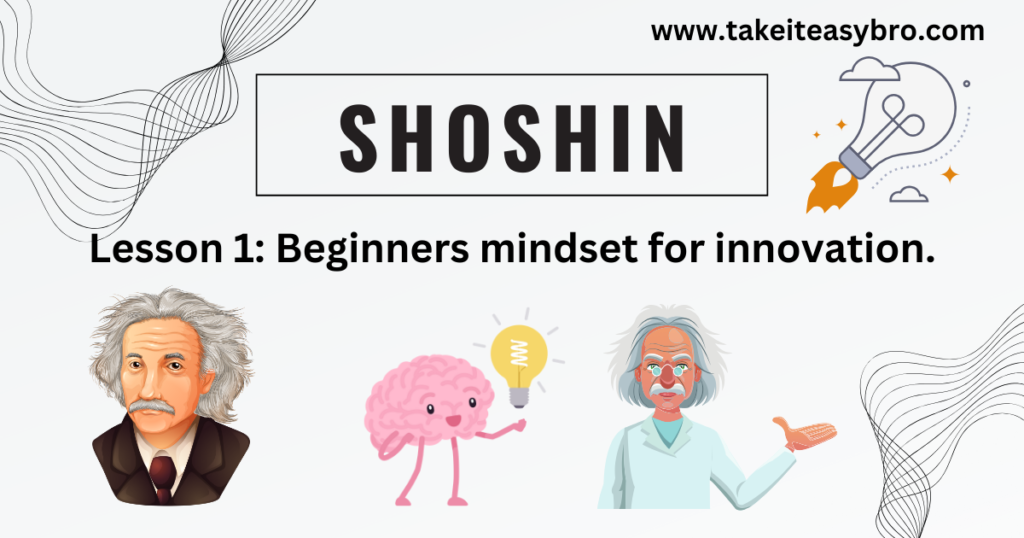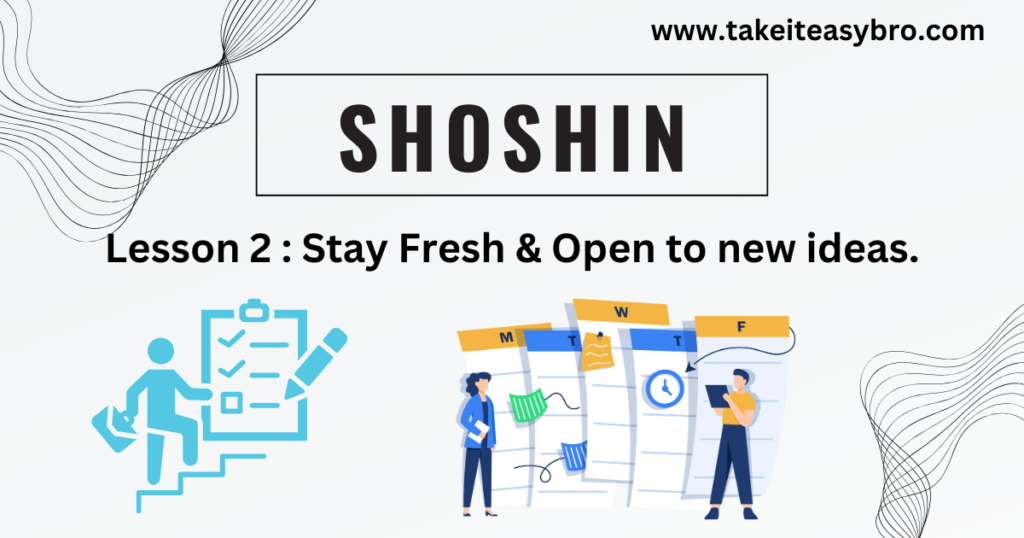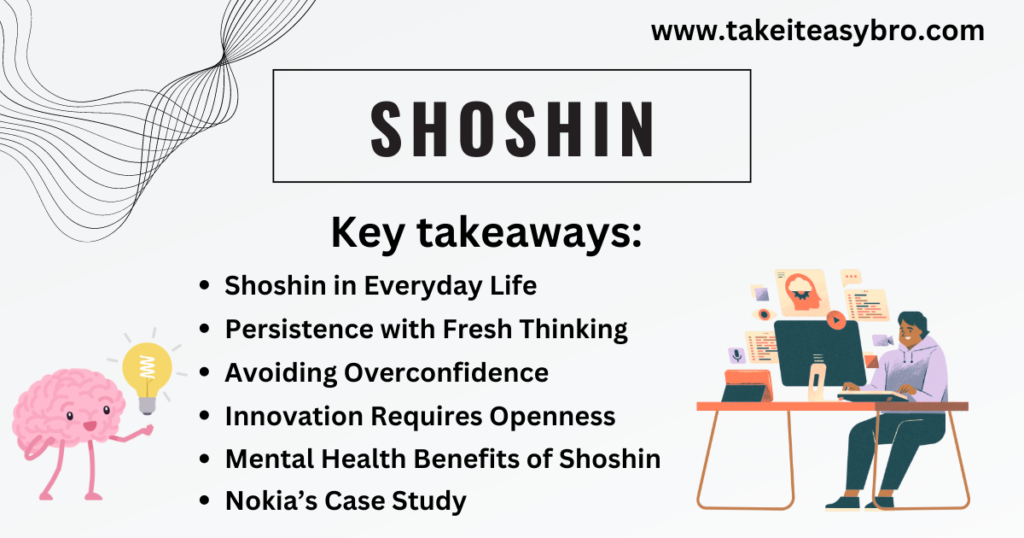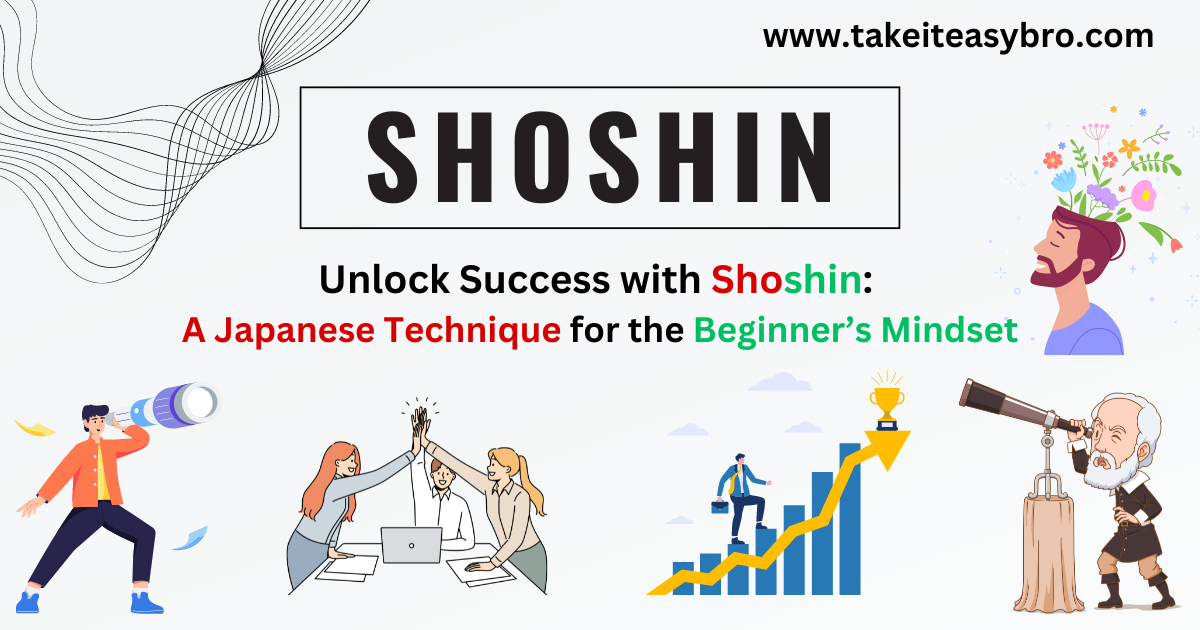Shoshin, a Japanese Zen concept, means having a beginner’s mindset. It highlights how important it is to stay open and eager to learn, even if you are an expert.
Experts often think they know everything and may ignore new ideas, while beginners are always ready to learn and grow. In this article, we’ll explore how adopting this beginner’s mindset, or ‘Shoshin,’ can lead to success.
Table of Contents
5 Ways a Beginner’s Mindset Can Transform Your Success
Successful people maintain a beginner’s mindset, or ‘Shoshin,’ always seeking to learn and improve. Meanwhile, those who overestimate their own abilities may end up failing. Here are 5 lessons on how adopting Shoshin can lead to success.

1. Beginners mindset for innovation
A person who never made a mistake never tried anything new.
Albert Einstein
Sometimes, when we work hard to achieve something, success doesn’t come easily, no matter how much effort we put in. If we keep pushing ourselves harder, it can lead to burnout. Instead, we need to understand the natural flow of things and approach the task with a fresh, open mindset, like a beginner—this is called Shoshin.
Einstein’s Story: Persistence, Innovation, and the Beginner’s Mindset
Einstein spent nearly a decade working on refining and correcting his earlier work on Special Relativity to account for gravity. In the early 1900s, his attempts to merge gravity with relativity faced many challenges and failures. At one point, Einstein even published an incorrect version of his theory in 1911. However, he didn’t give up.
In 1915, after years of revising equations, seeking help from mathematicians, and repeatedly returning to his work with fresh ideas, Einstein finally formulated the correct equations for General Relativity. His ability to maintain a beginner’s mindset, even after multiple setbacks, allowed him to revisit his assumptions and approach the problem from new angles each time he encountered a roadblock.
One of his famous quotes reflects this mindset: “A person who never made a mistake never tried anything new.” Einstein’s openness to failure, constant curiosity, and willingness to approach challenges with fresh thinking helped him revolutionize physics, showing the value of persistence and a beginner’s mind.

2. Stay Fresh and Open to New Ideas
When we’ve been doing the same job for years, it’s easy to fall into the mindset of “I know everything” This is natural. Our minds tend to stop noticing new things when stuck in a routine. I talked about this in my previous article on “The Red Car Theory.”
Think about the street next to your house. Since you’re so familiar with it, when you walk there, your mind hardly notices the surroundings and starts wandering off, daydreaming. Your feet know the path so well that you don’t even need to pay attention.
In the same way, our minds stop recognizing new ideas when we repeat the same patterns over and over. That’s why it’s important to stay open to new ideas, just like a beginner. Keep that curious mindset you had when you first joined the company or started a business, it’s key to stay fresh and up-to-date.

3. Embrace Confidence, Avoid Overconfidence
There’s a big difference between being confident and being overconfident. When people gain more experience, they sometimes become too sure of themselves and stop paying attention to others’ advice. This often leads to mistakes and failure.
Take Adolf Hitler during World War II as an example. At first, when Hitler came to power in Nazi Germany, he made clever plans and managed to conquer several countries. But when he decided to invade Russia, his overconfidence got in the way. He ignored the challenges, like the determination of the Russian people and the extremely harsh winter.
Because of this, Hitler’s army suffered a huge defeat. If he had approached the situation with an open mind, known as Shoshin, a beginner’s mindset, he might have been more careful and thought about the risks. By staying humble and open to learning, even as a leader, he might have avoided failure.

4. How a Beginner’s Mindset Boosts Mental Health
The beginner’s mindset isn’t just useful for tackling problems at work or in business; it can be applied to everyday life as well. By adopting Shoshin in daily activities, we can view obstacles as chances for new beginnings instead of seeing them as dead-ends.
Having a fresh, adaptable, and open mindset helps us stay relaxed and avoid stress or anxiety. When we accept changes as a natural part of life instead of resisting them, life becomes simpler and happier.

5. Nokia’s Fall : Absence of a Beginner’s Mindset
Background:
Nokia was once the dominant leader in the mobile phone industry, holding nearly 40% of the global market share in 2007. The company was known for producing durable, reliable phones and had a massive user base. However, in just a few years, Nokia’s market dominance collapsed, and by 2013, it had sold its mobile division to Microsoft.
The Role of Overconfidence:
Nokia’s fall can largely be attributed to its overconfidence and reluctance to adapt to the rapidly changing smartphone industry. When Apple introduced the iPhone in 2007, Nokia dismissed the touchscreen technology as a passing trend, believing that its existing products and software (Symbian) were good enough to maintain its market leadership. This overconfidence made Nokia slow to innovate, and the company failed to see the growing demand for smartphones with advanced operating systems.
Resistance to Change:
Instead of adopting a beginner’s mindset and being open to new ideas and technologies, Nokia continued to focus on what had worked for them in the past. Their executives were convinced that their existing operating system and hardware were superior. They underestimated the rise of iOS and Android, which were more user-friendly and innovative.
This closed mindset meant that Nokia didn’t explore new opportunities or reconsider its strategies. Even when the market clearly shifted towards smartphones with touchscreens and apps, Nokia clung to its outdated business model.
Missed Opportunities:
Nokia’s refusal to adapt to new trends and technologies, such as touchscreen smartphones and app-based ecosystems, cost them dearly. Had Nokia embraced a beginner’s mindset—Shoshin—it could have viewed these changes as opportunities to innovate and stay relevant. Instead, the company stuck with its traditional ways, leading to its downfall.
Lesson Learned:
Nokia’s story highlights how overconfidence and a lack of a beginner’s mindset can lead to failure. By staying open to new ideas, changes in the market, and the potential for improvement, companies (and individuals) can avoid the trap of complacency. Nokia’s inability to recognize the importance of innovation and change resulted in its rapid decline, serving as a reminder to always stay curious and adaptable.

Key Takeaways From This Article
The Power of a Beginner’s Mindset (Shoshin): A beginner’s mind is open to new ideas and eager for growth, while experts may become closed off, believing they know everything.
Shoshin in Everyday Life: Applying the beginner’s mindset to daily activities helps us view obstacles as opportunities and promotes a more stress-free, adaptable approach to life.
Persistence with Fresh Thinking: Albert Einstein’s persistence and fresh thinking helped him develop the theory of General Relativity, demonstrating the value of approaching challenges with Shoshin.
Avoiding Overconfidence: Confidence is important, but overconfidence can cloud judgment. Adolf Hitler’s failure in Russia during WWII exemplifies how ignoring risks can lead to downfall.
Innovation Requires Openness: Staying open to new ideas is essential in both work and life. When routines set in, it’s crucial to break out and stay curious for continued growth and success.
Mental Health Benefits of Shoshin: The beginner’s mindset can reduce stress and anxiety by helping individuals accept change as part of life rather than resisting it.
Nokia’s Case Study: Nokia’s downfall serves as a lesson on how overconfidence and resistance to change can lead to failure. Embracing a beginner’s mindset fosters adaptability and long-term success.
FAQ
What does shoshin mean?
Shoshin refers to having a beginner’s mindset, which means staying open and eager to learn, even if you’re an expert. It highlights the importance of approaching tasks with fresh thinking and curiosity, avoiding the mindset of “I know everything.” Shoshin encourages continuous learning and adaptability, helping individuals avoid the pitfalls of overconfidence and promoting success through innovation, persistence, and humility.
What is a shoshin in Japanese?
Shoshin in Japanese refers to a beginner’s mindset.
Shoshin in Japanese is written as 初心.
初 (sho) means “beginning” or “first.”
心 (shin) means “mind” or “heart.”
What is the shoshin technique?
The Shoshin technique involves adopting a beginner’s mindset in every situation, regardless of your expertise or experience. It means approaching tasks with openness, curiosity, and a willingness to learn, rather than assuming you know everything.


3 thoughts on “Beginner’s Mindset: 5 Ways Shoshin Can Help You Achieve Your Goals”